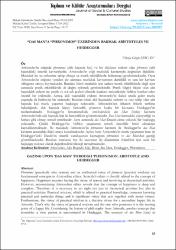| dc.contributor.author | Mocan, Fikriye Gözde | |
| dc.date.accessioned | 2022-06-29T10:27:33Z | |
| dc.date.available | 2022-06-29T10:27:33Z | |
| dc.date.issued | 2022 | en_US |
| dc.identifier.citation | Mocan, F. G. (2022). DAS MAN’A PHRONIMOS ÜZERİNDEN BAKMAK: ARİSTOTELES VE HEIDEGGER . Toplum ve Kültür Araştırmaları Dergisi , (9) , 18-37 . DOI: 10.48131/jscs.1084987 | en_US |
| dc.identifier.issn | 2667-5854 | |
| dc.identifier.uri | https://doi.org/10.48131/jscs.1084987 | |
| dc.identifier.uri | https://hdl.handle.net/11363/3602 | |
| dc.description.abstract | Aristoteles’in etiğinde phronimos (aklı başında kişi) ve bir düşünce erdemi olan phronesis (aklı
başındalık) önemli kavramlardır. Aristoteles’in etiği mutluluk kavramıyla doğrudan ilişkilidir.
Mutluluk ise us erdemine sahip olmayı ve teorik etkinliklerde bulunmayı gerektirmektedir. Oysa
Aristoteles’in etiğinin yeniden ele alınması mutluluk kavramının derinlikli ve tam bir kavram
olduğunu ortaya koymaktadır. Bundan ötürü mutluluk için sadece teorik etkinliklerde değil aynı
zamanda pratik etkinliklerde de doğru eylemek gerekmektedir. Pratik bilgiye ilişkin olan aklı
başındalık erdemi ise pratik ve tek tek şeyleri bilmede karakter erdemleriyle birlikte hareket eden
önemli bir erdemdir. Ayrıca, aklı başındalık erdemi Aristoteles’te ikinci sırada gelen mutlu
yaşamda da belirleyici bir erdemdir. Bundan ötürü aklı başındalık erdemi ve ona sahip olan aklı
başında kişi mutlu yaşamın başlangıç noktasıdır. Aristoteles’ten itibaren felsefe tarihine
bakıldığında aklı başında kişiye benzerlik gösteren başka bir kavrama Heidegger’de
rastlanmaktadır. Heidegger’in fenomenolojik ontolojindeki das Man (birisi) kavramı
Aristoteles’teki aklı başında kişi ile benzerlikler göstermektedir. Das Man kamudaki yüzeyselliği ve
herkes gibi olmayı temsil etmektedir. Aynı zamanda das Man Dasein olma yolunda bir başlangıç
noktasıdır. Çünkü Heidegger’de birlikte yaşamanın temeli öncelikle birisi olmaktan
kaynaklanmaktadır. Bu makalede Aristoteles’in phronimos kavramı ile Heidegger’in das Man
kavramı arasındaki ilişki ortaya konulmaktadır. Ayrıca hem Aristoteles’in mutlu yaşamının hem de
Heidegger’deki Dasein’ın otantik varoluşunun kaynağının phronimos ve das Man’dan geçtiği
gösterilmektedir. Bundan hareketle her iki kavramın iki düşünürün felsefeleri için nasıl bir
başlangıç noktası olarak değerlendirilebileceği tartışılmaktadır | en_US |
| dc.description.abstract | Phronimos (practically wise person) and an intellectual virtue of phronesis (practical wisdom) are
fundamental concepts in Aristotelian ethics. Aristotle's ethics is directly related to the concept of
happiness. Happiness requires having the virtue of reason and involving in theoretical activities.
However, reconsidering Aristotelian ethics reveals that the concept of happiness is deep and
complete. Therefore, it is necessary to act right not just in theoretical activities but also in
practical activities. Practical wisdom, which is related to practical knowledge, concerns knowing
practical and particular things and is significant virtue that acts together with moral virtues.
Furthermore, the virtue of practical wisdom is a decisive virtue for a secondary happy life in
Aristotle. That's why the virtue of practical wisdom and the one who possesses it is the starting
point of a happy life. Considering the history of philosophy from Aristotle, another concept that
resembles a wise person is encountered in Heidegger. The concept of das Man (one) in Heidegger's phenomenological ontology has similarities with the wise person in Aristotle. Das
Man represents superficiality in public and being like everyone else. At the same time, das Man is
the starting point on the way to becoming Dasein. Since in Heidegger, the basis of living together
is derived from being someone primarily. In this article, the relationship between Aristotle's
concept of phronimos and Heidegger's das Man is put forward. In addition, it is pointed out that
both Aristotle's happy life and Heidegger's Dasein's and its authentic existence passes through
phronimos and das Man. From this point of view, it is discussed how both concepts can be
evaluated as a starting point for the philosophies of the two thinkers | en_US |
| dc.language.iso | tur | en_US |
| dc.relation.isversionof | 10.48131/jscs.1084987 | en_US |
| dc.rights | info:eu-repo/semantics/openAccess | en_US |
| dc.rights | Attribution-NonCommercial-NoDerivs 3.0 United States | * |
| dc.rights.uri | http://creativecommons.org/licenses/by-nc-nd/3.0/us/ | * |
| dc.subject | Aristoteles | en_US |
| dc.subject | Heidegger | en_US |
| dc.subject | Phronimos | en_US |
| dc.subject | Aristotle | en_US |
| dc.title | “Das Man”A “Phronimos” Üzerinden Bakmak: Aristoteles Ve Heidegger | en_US |
| dc.title.alternative | Gazing Upon ‘Das Man’ Through ‘Phronimos’: Aristotle And Heidegger | en_US |
| dc.type | article | en_US |
| dc.relation.ispartof | Toplum ve Kültür Araştırmaları Dergisi | en_US |
| dc.department | İktisadi İdari ve Sosyal Bilimler Fakültesi | en_US |
| dc.authorid | 0000-0001-5662-5912 | en_US |
| dc.identifier.issue | 9 | en_US |
| dc.identifier.startpage | 18 | en_US |
| dc.identifier.endpage | 37 | en_US |
| dc.relation.publicationcategory | Makale - Ulusal Hakemli Dergi - Kurum Öğretim Elemanı | en_US |
| dc.contributor.institutionauthor | Mocan, Fikriye Gözde | |



















